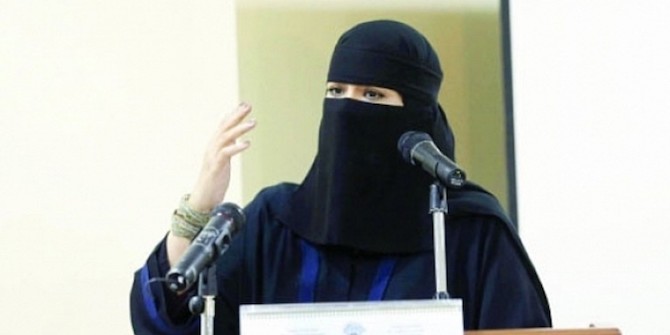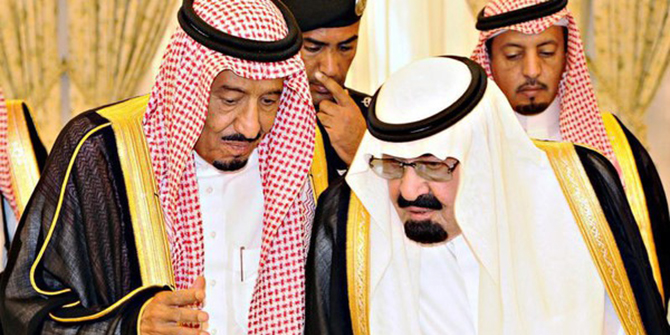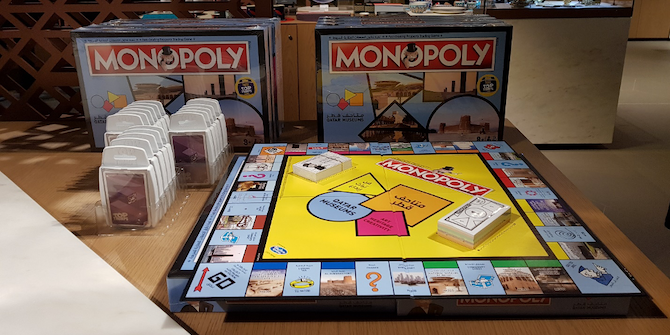by Samuel R. Greene and Nathan W. Toronto
This memo was presented at a workshop organised by the LSE Middle East Centre and the UAE National Defense College on 12 January 2016.

How does globalisation influence state development? Academic and policy writing addressing trafficking and labour law, as well as broader research on globalisation, have made contradictory predictions about how greater engagement with global markets shapes the institutional development of young states, such as those of the Gulf Cooperation Council (GCC). Some research suggests that increased participation in the global economy will improve the treatment of labour, but other research suggests that such participation will undermine the treatment of labour. Understanding this dynamic is especially important for human trafficking and the enforcement of labour laws, issues that carry moral implication and that GCC countries have repeatedly received criticism on.
In order to better understand how globalisation influences state development and labour patterns, this project uses large-n statistical analysis to explore the relationship between trade exposure and foreign direct investment, on the one hand, and perceptions of compliance with norms of combatting human trafficking, on the other. This study contributes to a gap in the literature on GCC states, as well as to the broader theoretical question about the relationship between increased participation in global markets and the treatment of labour. In addition to statistical analysis, we compare two different country groups via qualitative analysis: the UAE and Qatar, and Nicaragua, Guatemala, and El Salvador, since they share many characteristics within group, but vary substantially in their respective approaches to outside investment.
If participation in global markets does lead to a greater likelihood of reform, countries that have more aggressively pursued foreign investment, such as the UAE and Nicaragua, would be expected to have made more advances in combating human trafficking and reforming labour legislation. However, if participation in global markets undermines reform, countries in the Gulf and beyond that have less outside investment, such as Qatar and Guatemala and El Salvador, should have more favourable records in improving opposition to trafficking and labour reform.
We gathered data on 177 countries between 2001 and 2014, and used US State Department Trafficking in Persons (TIP) reports to measure perceptions of compliance with norms of combatting human trafficking. These TIP reports classify countries into one of four categories: Tier 1 (the country complies with minimum standards on combating human trafficking), Tier 2 (trafficking is substantial, and there are active and ongoing efforts to comply with standards), Tier 2 Watch List (trafficking is substantial, but there are signs a country is working to comply with standards), and Tier 3 (trafficking is widespread, with no attempt to comply with standards). While we incur some risk of measurement bias by using only one, politicised source to measure adherence to norms on labour protection, we manage this risk with a mixed-methods approach.
To measure the level of involvement in the global economy, we used data from the World Bank: total trade as a percentage of gross domestic product (GDP) and foreign direct investment (FDI) inflows as a percentage of GDP. In this preliminary analysis, we also used dummy variables for GCC countries and for the United Arab Emirates (UAE).
Across all 177 countries, we find a robust, statistically-significant positive relationship between indicators of involvement in the global economy and the protection of labour: more involved countries receive higher TIP scores. However, GCC countries are systematically more likely to receive lower TIP scores, even when controlling the level of involvement in the global economy. At the same time, the UAE defies this GCC trend, since it is more likely to receive higher TIP scores, as opposed to lower.
A similar finding is present in Nicaragua, which has frequently received higher TIP scores than its Central American neighbours such as Guatemala and El Salvador. Nicaragua also has the highest per-capita rate of foreign direct investment among the countries in question. While poor Central American countries have very different economic challenges and labour conditions than wealthy states in the Gulf, the basic statistical correlation holds.
Initial case study evidence suggests that in the Gulf, an economic strategy that emphasises the attraction of outside investment leads to a different narrative about labour and trafficking. Both the UAE and Qatar have faced criticism of labour conditions on both prominent projects such as the NYU Abu Dhabi construction on Saadiyat Island (UAE) and construction on World Cup stadium work sites (Qatar). However, the UAE’s responses have acknowledged possible irregularities, placing blame on bad actors that fail to comply with its law, which is linked to international norms and standards. By contrast, Qatar has largely denied allegations of labour violations as unwarranted external criticism, while seeking to accommodate local interests that are reluctant to accede to reform.
Nicaragua, which has served as ‘reference point’ for many regional countries in their efforts to combat trafficking, shows a link between the left-wing Sandinista (FSLN) government’s transition to embrace open markets and its attainment of strong ranking of its efforts to oppose trafficking and forced labour. This contrasts with the more contested positions of both Guatemala, which has been governed by the right, and El Salvador, which has been controlled by the left since 2009. In Guatemala, criminal networks have held significant influence in government, including the alleged collusion with former President Otto Perez Molinato stymie reform, while Salvadoran leftists have been less inclined to promote free trade.
When it comes to labour issues, decision makers in Gulf countries are presented with stark choices. No countries have such a large proportion of foreigners in their populations, but the economic growth strategies of these states depend on importing labour in large numbers. In some cases, there have been allegations of mistreatment of foreign labour, as evidenced by TIP and other reports. There are also instances, however, in which countries in the Gulf have improved their perception in the treatment of foreign labour and combating human trafficking. The question is, why?
Our preliminary evidence suggests that in one of these countries, the UAE, the presence of high levels of foreign direct investment and total trade are linked to improved perceptions of fighting human trafficking. There is reason to believe, furthermore, that these improved perceptions are less the result of slick messaging and clever news reporting than they are of actual changes on the ground. More research remains to be done on this score, but we plan to examine the reasons behind why newspapers in the Gulf cover labour issues the way they do, conduct interviews with decision-makers involved in labour protection, and diversify our sources of measurement. Still, our preliminary evidence corroborates the proposition that states that are more engaged in the global economy are more likely to adhere to international norms on the protection of labour.
 Dr Samuel Greene is Assistant Professor at the United Arab Emirates National Defense College. His primary research interest is the study of democratic transitions and consolidation in new democracies.
Dr Samuel Greene is Assistant Professor at the United Arab Emirates National Defense College. His primary research interest is the study of democratic transitions and consolidation in new democracies.
 Dr Nathan W. Toronto is Associate Professor of Security and Strategic Studies at the United Arab Emirates National Defense College. His research interests include Middle East security, theories of warfare, and civil-military relations.
Dr Nathan W. Toronto is Associate Professor of Security and Strategic Studies at the United Arab Emirates National Defense College. His research interests include Middle East security, theories of warfare, and civil-military relations.
Other memos presented at the workshop:
- Cutting out the Middle Man: GCC Economic Strategies for Tackling Migration Racketeering
by Omar Al-Ubaydli
- Neoliberal Citizenship: The Transformation of Belonging
by Kevin W. Gray







1 Comments